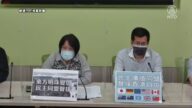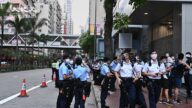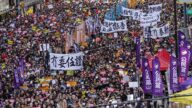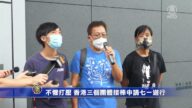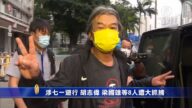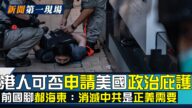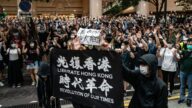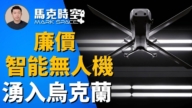【新唐人2012年6月29日讯】《华尔街日报》和香港《明报》先后报导,香港的英文大报《南华早报》不再续约外籍驻华记者慕亦仁。一直关注中国人权和中国公共事件的慕亦仁认为,“不再续约”是政治上的原因,与总编王向伟有关系。据了解,王向伟具有吉林省政协委员的背景。而“香港记者协会”对香港新闻机构受中共政府干扰及自我审查,也感到担忧 。
《华尔街日报》“亚洲看点”于6月25号报导说,《南华早报》主编王向伟对一位屡获人权新闻奖的外籍驻华记者慕亦仁(Paul Mooney)打出重拳,上个月告诉他因为经费原因不再与他续约。香港《明报》也在27号报导了这件事。
原《南华早报》记者慕亦仁:“我觉得是跟政治有关系,因为我在报社工作大概有两年的合同。 不过有20多年的历史,我一直给他们发稿子,是1990年(开始),而且我得了很多新闻奖,而且他是4月底才告诉我不跟我签合同。”
慕亦仁从23年前开始报导与中国大陆有关的公共事件,并且关注中国大陆人权议题。今年4月,他获得了香港记协和香港外国记者协会等颁发的“人权新闻奖”﹔去年,慕亦仁发表的一篇关于中国重金属污染的文章也荣获“ 亚洲出版协会新闻奖”。
今年2月,《南华早报》宣布任命报社的副总编王向伟担任总编,他曾任职于官方媒体《中国日报》, 1996年加盟《南华早报》。王向伟目前是吉林省政协委员。
慕亦仁披露,《南华早报》老板在大陆有投资,开了很多饭店,所以,不想得罪中共政权。并且,老板认为王向伟是大陆那边的,能帮他的忙,就一直扶持他。
慕亦仁表示,王向伟上台前,他经常能在报纸上发稿。但是,自从去年前总编因触及中共敏感议题被迫离职、王向伟上台后,他写了20多篇涉及大陆维权等敏感议题的新闻稿,只发表了两篇,其中一篇还与熊猫有关系。另外,慕亦仁在美国采访了高智晟的夫人耿和,一开始,编辑想用,后来又告诉他“王向伟说不要”。
慕亦仁:“他上台之前,我想写什么题目,大部分都可以,新疆问题、西藏问题、人权,我就跟总编辑或副编辑说一下,他们说好的。如果他们觉得有价值,他就说可以。他来了以后,有重要的新闻都不能写。”
去年中东茉莉花革命后,中国大批维权人士被抓,慕亦仁在前总编的同意下写了稿,但是,三个月后稿子才被刊登。
另外,从“李旺阳事件”的报导中也能看出些端倪。《南华早报》对“李旺阳事件”报导的印刷首版有400多字,零售版则缩到100字。
慕亦仁认为,很难相信这不是王向伟的决定。
慕亦仁指出,王向伟是吉林政协委员,他不仅控制像西藏、新疆、维权律师高智晟、倪玉兰等这些敏感问题的发表,还施压经常写人权问题的记者。
慕亦仁:“还有其他的一些记者跟我说,他跟他们说,“啊,你以后不要写那么多人权,不要写那么悲哀的新闻”,他就跟他们说了。大家都很害怕。”
慕亦仁认为,更为严重的是,现在《南华早报》不只是敏感的新闻不用,还经常直接用大陆的宣传稿,没有任何新闻价值。
慕亦仁通过与香港记者朋友聊天,感到香港中英文报纸媒体受到限制成了一个趋势,香港言论自由的前途很令人担心。
“国际记联”中国区负责人、“香港记协”主席胡丽云指出,透过《南华早报》不再续约有丰富媒体经验的记者事件,引发“记协”对香港新闻机构受中共政府干扰及自我审查的担忧。她希望他们本着一个有影响力的媒体负责任的态度,给公众一个回答。
采访/秦雪 编辑/宋风 后制/肖颜
Hong Kong Media Ex-Reporter Unveils Self-Censorship
Wall Street Journal and Hong Kong’s Ming Pao reported
of a failure of Hong Kong’s South China Morning Post to renew contract with its foreign journalist Paul Mooney.
Mooney has long dedicated himself to reporting on China’s
human rights and public events, thus he views the issue as a political decision.
The Post’s chief editor Wang Xiangwei, a member of
Jilin’ Political Consultative Conference Committee (PCCC), is believed to be behind the issue.
Hong Kong Journalists Association expressed concerns
of the public over the mainland communist regime’s control.
The regime interferes with and requests self-censorship
from Hong Kong’s media outlets.
The Post’s chief editor Wang Xiangwei failed to renew
a contract with Paul Mooney
since this May due to budget problems,
the Wall Street Journal reported on June 25.
Paul Mooney is known for writing many
award-winning reports on China’s human rights.
The news were also covered
by Hong Kong’s Ming Pao on the 27th of June.
Paul Mooney (ex-journalist, the Post): “I think this was
a political decision. I have been on contract for two years.
I wrote articles for the newspaper since 1990, some
20 years now, and I’ve won many awards for my reporting.
He didn’t inform me until the end of this April,
that he would not be able to renew my contract.”
Mooney began to report on mainland China’s public events
and human rights issues 23 years ago.
In April, he won Hong Kong’ Human Rights Press Award,
and a Society of Publishers in Asia award for his article on heavy-metal pollution, published in 2011.
This February, the Post promoted Wang Xiangwei
to a chief editor from his deputy chief editor position.
Wang joined the Post in 1996, and previously worked for
China Daily, Chinese Communist Party'(CCP) official media.
Currently, he is a member of Jilin’s PCCC.
Mooney disclosed that the Post’s head owns many hotels
in mainland China and is reluctant to offend CCP’s regime.
Thus the head nurtures mainlander Wang,
believing Wang has some influence in the mainland.
Mooney’articles were published in the newspaper regularly,
until Wang took office, the journalist says.
The former chief editor was forced out for sensitive topic
reporting, and now under Wang’s censorship Mooney got only two stories published, one of which on panda bears.
The rest – some 20 China stories – were all
on sensitive issues, including rights-defenses.
In the US, Mooney had interviewed Geng He,
the wife of China’s renowned lawyer Gao Zhisheng.
Mooney reveals that an editor expressed interest
in the story, but later told him that Wang had spiked it.
Mooney: “Before he took office I could write any newsworthy
stories, like issues on Xinjiang, Tibet and human rights,
as long as I got the nod from the chief editor or his deputy.
After he came in, all important news
were not allowed to be covered.”
In 2011, the Middle East ‘Jasmine revolution’ affected China,
and great many rights activists were arrested by the regime.
Even with approved proposal by the deputy chief editor,
Mooney’s finished article would languish for three months before being published.
The Post’s coverage on the death of Li Wangyang
is another example.
An original 430-words article in its first edition was shaved
down to a brief 100 words piece for the next edition.
Mooney notes, it is hard to believe that the decision
was made by anyone but Wang.
Wang, a member of Jinlin’s PCCC, not only rejects pieces,
covering sensitive topics, but also pressures the journalists who report on China’s human rights.
Mooney: “Some staff reporters said to me, ‘Don’t report
on so many miserable human rights stories any more.’
That means he told them so,
and everyone is afraid."
What is worse, the Post frequently uses CCP’s official
press releases, which have no news value, Mooney shares.
After talking with his Hong Kong peers, Mooney realized
there is a tendency in Hong Kong-based newspapers,
both Chinese and English to go under restriction.
Hong Kong’s future, in terms of freedom of speech,
is worrisome, he remarks.
Woo Lai-wan, president of Hong Kong Journalists
Association and China region Chief of International Federation of Journalists, spoke on the issue too.
Woo pointed out that Mooney’s contract not being renewed
has aroused concerns within the Association.
They think the CCP has interfered with and exerted
self-censorship on the Hong Kong’s media outlets.
Woo appealed to the South China Morning Post
to openly respond to these concerns of the community.



